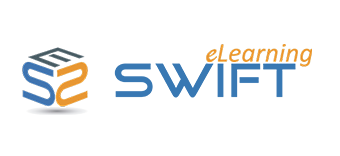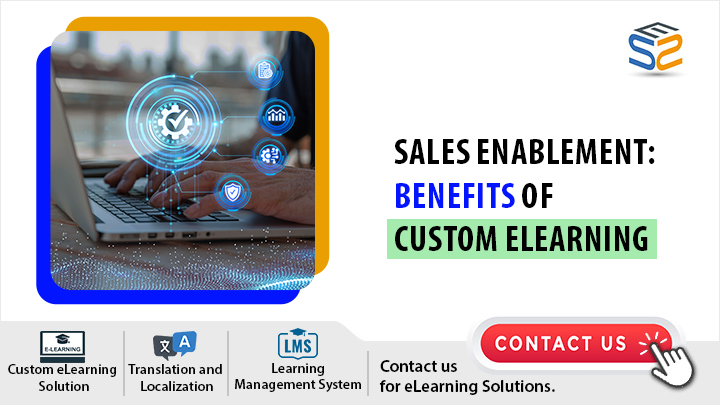Sales Enablement: Benefits of Custom eLearning
Effective sales enablement equips sales teams with the resources they need to excel. Custom eLearning stands out as a powerful tool in this area, offering tailored training solutions that address the specific needs of sales professionals. Unlike generic training programs, custom eLearning is designed to align with a company’s unique objectives, products, and challenges.
This blog explores the benefits of custom eLearning for sales enablement and the importance of targeted sales training in driving business growth.
Why is Sales Training Important?
Sales training is crucial because it directly impacts a company’s revenue and growth potential. Sales professionals are on the front lines, interacting with customers and closing deals. Their ability to understand and effectively communicate the value of your products or services can determine the success of your business.
Key reasons why sales training is important:
Improves Sales Skills: Training enhances the skills of sales teams, equipping them with techniques and strategies to better engage prospects and close deals.
Increases Product Knowledge: Comprehensive training ensures that sales professionals have a deep understanding of the products or services they are selling, allowing them to address customer needs more effectively.
Boosts Confidence: Well-trained salespeople are more confident in their abilities. Confidence translates into better performance and a more persuasive sales approach.
Aligns Teams with Company Goals: Training aligns sales teams with the company’s objectives and sales strategies, ensuring that everyone is working towards the same goals.
Adapts to Market Changes: Ongoing training helps sales teams stay current with market trends, new technologies, and evolving customer needs, keeping them competitive and effective.
1. Tailored Learning Experiences
Custom eLearning provides training that meets the specific needs of your sales team. Unlike a generic approach, custom eLearning focuses on your company’s unique sales processes and goals.
Sales teams face distinct challenges based on their products, markets, and customer needs. Custom eLearning allows you to design training modules that address these specific issues. For example, if your sales team needs to master a new product line, custom content can cover all relevant details, including features, benefits, and competitive positioning.
This targeted approach ensures that the training is relevant and directly applicable to the sales team’s daily activities. It also helps to engage learners by connecting training materials to their actual work, leading to better understanding and application of the concepts.
2. Increased Engagement and Interaction
Engagement is crucial for effective learning. Custom eLearning can incorporate interactive elements that make the training more engaging. This can include simulations, interactive scenarios, and gamified learning activities.
Interactive components allow sales professionals to practice and apply their skills in a controlled environment. For example, scenario-based learning can simulate real-life sales situations, enabling learners to make decisions and see the outcomes. This hands-on experience helps reinforce learning and improves retention.
Incorporating gamification elements, such as leaderboards and rewards, can also motivate sales teams to engage more deeply with the training. The result is a more dynamic learning experience that holds the attention of your sales professionals and enhances their skills.
3. Flexibility and Scalability
Custom eLearning offers flexibility in both content delivery and scalability. Sales teams can access training materials on-demand, which fits well with their busy schedules.
This flexibility is particularly valuable for organizations with global sales teams. Custom eLearning can be designed to accommodate different time zones and learning preferences. Additionally, as your organization grows or changes, custom eLearning can be easily updated to reflect new products, markets, or sales strategies.
Scalability is another significant benefit. Whether you need to train a small team or a large organization, custom eLearning can be scaled to meet your needs. New modules can be added, and existing ones can be updated as required, ensuring that the training remains relevant and effective.
4. Measurable Impact and ROI
One of the key advantages of custom eLearning is the ability to measure its impact. By integrating learning management systems (LMS) and analytics tools, you can track various metrics related to the training program.
You can monitor learner progress, engagement levels, and assessment results. This data provides insights into how well the training is performing and where improvements may be needed.
Measuring the return on investment (ROI) is also possible with custom eLearning. By aligning training objectives with business goals, you can assess how effectively the training contributes to improved sales performance. For instance, if the goal is to increase sales of a specific product, tracking sales data alongside training results helps demonstrate the value of the eLearning program.
5. Brand Consistency and Cultural Alignment
Custom eLearning allows you to incorporate your company’s brand values and cultural aspects into the training content. This ensures that sales professionals are not only knowledgeable about the products but also represent the company consistently.
Brand consistency is essential for maintaining a unified company image. Custom eLearning helps sales teams understand and communicate the brand’s message and values effectively. This alignment strengthens the company’s reputation and builds trust with customers.
For global organizations, cultural alignment is also important. Custom eLearning can be adapted to reflect regional differences, ensuring that training resonates with diverse audiences and meets local needs.
Frequently Asked Questions (FAQs)
Q1. What is custom eLearning?
A. Custom eLearning refers to training solutions specifically designed to meet the unique needs of an organization. It is tailored to address the specific goals, challenges, and requirements of the sales team.
Q2. How does custom eLearning differ from off-the-shelf solutions?
A. Custom eLearning is designed to address the specific needs of your organization, while off-the-shelf solutions provide generic content that may not align with your unique requirements.
Q3. What are the main benefits of custom eLearning for sales teams?
A. Custom eLearning offers tailored content, increased engagement, flexibility, scalability, measurable impact, and brand consistency. It ensures that training is relevant and effectively supports the sales team’s performance.
Q4. Can custom eLearning be updated as our business needs change?
A. Yes, custom eLearning can be easily updated to reflect changes in your business, such as new products or market expansions. This ensures that the training remains relevant and effective.
Q5. How can we measure the success of our custom eLearning program?
A. Success can be measured by tracking metrics such as learner progress, engagement levels, and assessment results. Additionally, aligning training objectives with business goals allows for evaluating the impact on sales performance and ROI.




